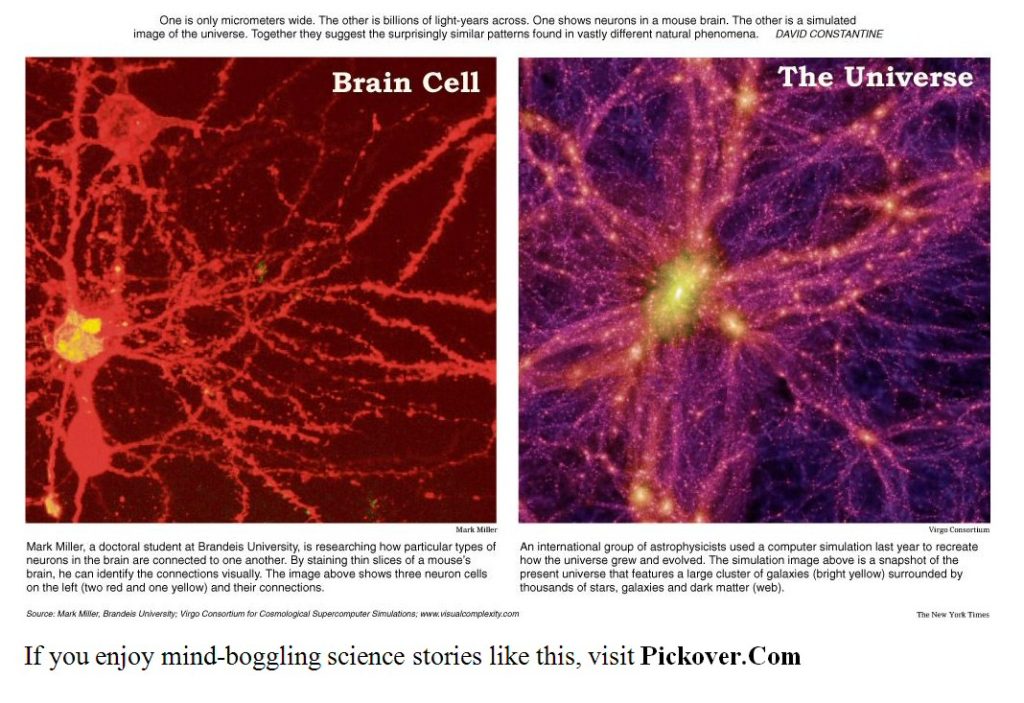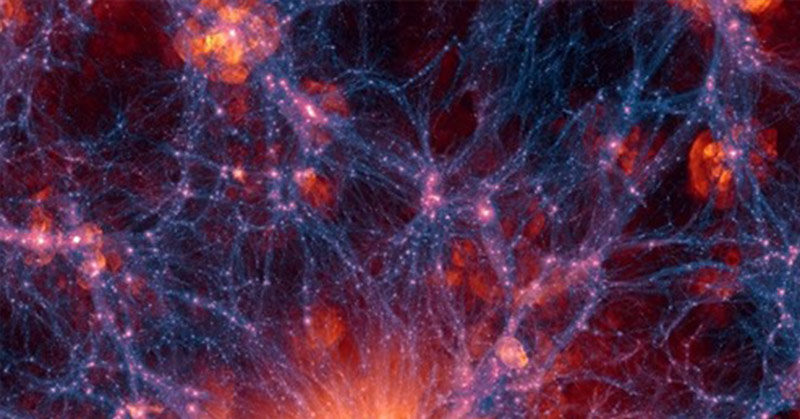Although they seem vastly different, the human brain and the universe actually have a surprising amount in common. Scientists have demonstrated this before, in an image that occasionally makes its rounds on the internet. The photo shows a human neuron and a simulated galaxy cluster. Side-by-side, the two look shockingly alike [1].
Two scientists from Italy took that comparison one step further. In their new pilot study, they compare the neuronal network in the human brain with the cosmic network of the galaxies in the universe. All told, these are two of the most complex systems in nature.

The Human Brain and the Universe
The two scientists responsible for the study are astrophysicist Franco Vazza of the University of Bologna, and Alberto Feletti of the University of Verona, both in Italy. Their purpose was to find out if the similarities between the human brain and the universe were more than just by the way they look.
With a hundred billion neurons, and a hundred trillion connections, the human brain is one of the most complex objects in our universe. That made Vazza and Feletti wonder- is the human brain more complicated than the galaxies in our universe?
“Galaxies can group into enormous structures (called clusters, superclusters, and filaments) that stretch for hundreds of millions of light-years,” they explained in Nautilus in 2017. “The boundary between these structures and neighboring stretches of empty space called cosmic voids can be extremely complex.” [2]
They continued to explain that considering the number of bits of information it takes to describe it, the void-filament boundary is one of the most complex volumes in the universe. So which is more complex- the brain or the universe?
Read: Scientists spot a ‘kilonova’ flash so bright they can barely explain it
How Did They Compare the Human Brain and the Universe?
To answer their question, the team used quantitative analysis. They based their analysis on images from slices of the human cerebellum and cortex at different magnifications. They then compared these to simulations of the cosmic web.
Specifically, they were looking for matter density fluctuations between brains and the cosmic web. Given the overwhelmingly large size difference between the brain and the universe, these relative fluctuations occur on vastly different scales. Despite this, the similarities between the two were striking [3].
What Did They Find?
“We calculated the spectral density of both systems. This is a technique often employed in cosmology for studying the spatial distribution of galaxies”, explained Vazza. “Our analysis showed that the distribution of the fluctuation within the cerebellum neuronal network on a scale from 1 micrometer to 0.1 millimeters follows the same progression of the distribution of matter in the cosmic web but, of course, on a larger scale that goes from 5 million to 500 million light-years”. [4]
So our brains and the universe have a similar distribution of matter, but what else do they have in common? The physical processes that create the structure of the human brain and that of the universe are extremely different. The researchers said, however, that they can result in similar levels of complexity and self-organization.

The list of commonalities between the human brain and the universe, then, is surprisingly long:
- The human cerebellum has around 69 billion neurons. The cosmic galaxy contains over 100 billion galaxies. In the grand scheme of things, those numbers aren’t wildly different.
- Distinct networks make up both systems, each containing nodes. In the brain, we call those nodes neurons, in the universe, we call them galaxies. In both cases, filaments connect these nodes.
- The radius of both neurons and galaxies are only a fraction of the length of the filaments. The flow of energy and information between the nodes is only about 25 percent of the mass and energy content of each system.
- The brain is about 77 percent water, the universe is about 72 percent dark energy. While both of these materials appear to be passive, they play an indirect role in their internal structures [5].
Read: For the First Time Ever, Scientists Caught Time Crystals Interacting
The Brain and the Universe: Connections and Memory
The team already knew many of these similarities before their research. So what else did they find?
They learned that the cosmic web had an average of 3.1 to 4.8 connections per node. The human cortex was not that dissimilar. It had an average of 4.6 to 5.4 connections per node. Both systems tended to cluster their connections around central nodes, and both had a similar information capacity [5].
Additionally, a 2015 study calculated that the memory of the human brain is about 2.5 petabytes [6]. Vazza conducted another study in 2019 which found that the memory capacity needed to store the complexity of the universe is approximately 4.3 petabytes [7].
The Brain and the Universe: More Similarities than Differences?
The universe, of course, does not have a sentient brain the way humans do. The similarities in memory capacity between the human brain and the universe, however, may indicate that the laws that govern their growth and structure could be the same [2].
“Once again, structural parameters have identified unexpected agreement levels,” said Feletti. “Probably, the connectivity within the two networks evolves following similar physical principles, despite the striking and obvious difference between the physical powers regulating galaxies and neurons.” [5]
This study by Vazza and Feletti, along with other similar studies, are very important. The hope is that they will help scientists better understand the laws that govern both our brains and the universe.
These two vastly different networks, says Feletti, show more similarities than those shared between a cosmic web and a galaxy, or a neuronal network and the inside of a neuronal body. With the knowledge, the more we learn about one, the more we may be able to learn about the other.
Keep Reading: Mystery Meteorite Contains “Impossible to Naturally Exist” Crystal
Sources
- https://sprott.physics.wisc.edu/pickover/pc/brain-universe.html
- https://nautil.us/issue/50/emergence/the-strange-similarity-of-neuron-and-galaxy-networks
- https://www.frontiersin.org/articles/10.3389/fphy.2020.525731/full#B6
- https://www.eurekalert.org/pub_releases/2020-11/udb-dth111620.php
- https://www.sciencealert.com/wildly-fun-new-paper-compares-the-human-brain-to-the-structure-of-the-universe
- https://elifesciences.org/articles/10778
- https://academic.oup.com/mnras/article-abstract/491/4/5447/5644441?redirectedFrom=fulltext

